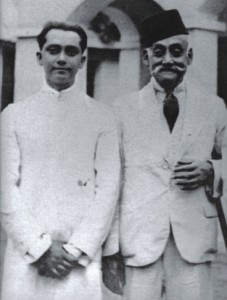Remembrance
 |
| Habibur Rahman with his father Khan Bahadur Hafizur Rahman Chowdhury. Bogra 1937 |
The Dust of our Fathers
Nadeem Rahman
I once visited my Father's grave at 5.00 am, on a cold winter dawn. The little gate to the family graveyard was locked, so I was obliged to climb over it, which was uncomfortable but none too difficult. The place was deserted, dusty and untended. There was no grass, only a few weeds, some wild shrubs and a scraggly tree. Light had just begun to pierce the cobweb of mist and since I was alone, I must confess to feeling less than brave, in the lingering shadows. My forefathers had just departed…
I stood and contemplated the generation before me. What saints or sinners they were, I can't imagine. I have only heard of their eccentric, compassionate and extravagant exploits. Sometimes of course, in the manner of all humanity, they were horribly ignoble. But one, I knew well, in that neglected garden of souls who before leaving, placed his world of values in the palm of my hands:
My Father Habibur Rahman, also known as Bulu Mia of Bogra was a simple man, and a humble son of the soil. Educated at Bogra Zilla School and the universities of Dhaka and Calcutta, he distinguished himself throughout his life in three careers spanning three eras of history. Bogra's youngest Public Prosecutor, he was awarded the title of Khan Bahadur, which he later renounced during the anti-colonial campaign. By then, he was already a Director of the Reserve Bank of India. In public office, he held countless posts at every level and was elected to the National Assembly. He was Central Minister for Education, Information and Broadcasting, National Reconstruction and Minority Affairs. He was Ambassador to half the world.
Yet, whatever titles and honours he earned along the way, he always remained Bulu Mia of Bogra, and though he travelled to the ends of the earth, throughout his life, he lived and breathed the Bangali ethos.
As a young man, I did not always agree with my Father's wisdom and vision. They were too prosaic and “respectable” for my ostentatious young blood, lacking the flair and flamboyance of his more ambitious contemporaries. In hindsight, there is nothing I appreciate more than the self-effacing simplicity of his style - a far cry from the monster egos we must endure today. What I recall most of all, was his un-abiding attachment to the land of his birth. So much so in fact, that when I took him to consult a physician in London, he obtained a formal oath from me, promising that should he die abroad, I would bring back his dead body, for burial in Bogra. He returned alive and when he died some years later, I did indeed accompany my Father on his last journey across the river Jamuna, all the way to his beloved birthplace. It was the one time I kept my word to him.
My Father died of a broken heart, for more reasons than I am qualified to comprehend. But standing at his feet that morning, I could not help but wonder, is this the sum total of goodness dust! All that he stood for was vanquished, by the simple passage of time. Today, few in his hometown even recall his name, soon it will be forgotten altogether and yet I knew, he wouldn't want it any other way. It is only befitting that his dust should mingle with the soil that made him. Unknowingly, I had fulfilled my promise, by leaving him undisturbed in an unmarked grave in the heart of rural Bengal. This, was the earthly essence of Bulu Mia. I could almost feel his quiet contentment, in the embrace of eternity.
Thank God for small mercies, after all, who would want to be remembered in a society that rehearses history by reinventing it, that honours its heroes with bullets and bombs and bestows greatness by assassination? A society well versed in nation building, by changing the names of roads and edifices, built by others. Who is the brave fool to flirt with ingratitude? Life is indignity enough and when mischief is afoot, good men are better off dead.
Habibur Rahman was blessed with unworthy sons - and I, perhaps the principal culprit. I possess none of the qualities necessary to honour his legacy, let alone console a father's disappointments. Any hope of absolution rests in the boundless compassion of fatherhood. Wayward sons take heart, in the dust of our fathers, stir the roots of our redemption.
“We think our Fathers fools, as wise we grow
Our wiser sons no doubt, will think us so…”
25 January 2009, will mark the 100th birth anniversary of Habibur Rahman
.Copyright
(R) thedailystar.net 2009 |
|
